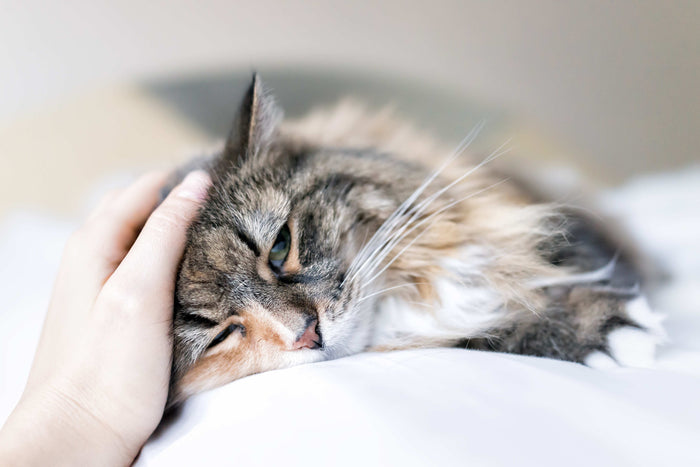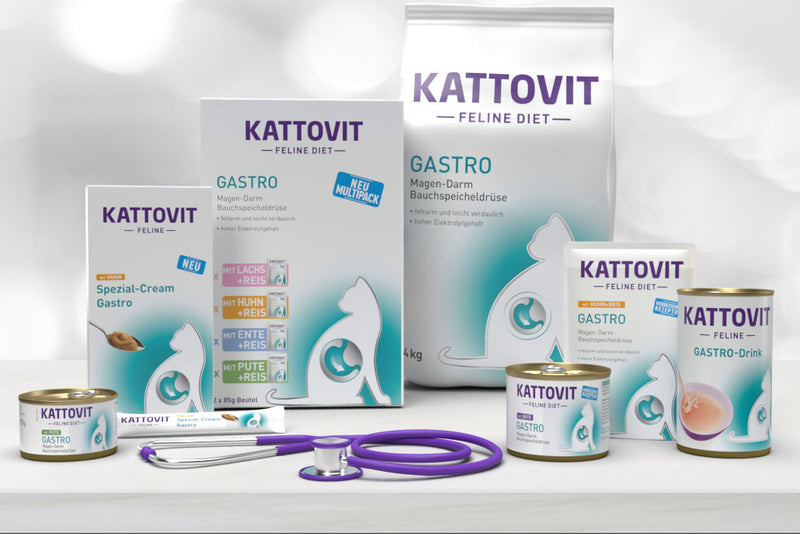Newsletter
Subscribe to Newsletter
Stay informed and always up to date with KATTOVIT. Be the first to hear about new products, discounts, advice texts, etc.
Cart
Your cart is empty

Symptome
Cat sleeps a lotCats sleep a lot, even when they're energetic during playtime. Learn how much sleep cats need, why they sleep so much, and when increased tiredness should be a cause for concern.

Symptome
Cat drinks a lotIs your cat suddenly drinking more than usual? This can indicate health problems. Find out here how much liquid cats normally need, how to recognize excessive thirst and what the possible causes are.

Symptome
Cat vomitsDoes your cat vomit frequently? This can happen during the shedding period, but it is not always harmless. Find out how you can support your cat with the right diet, supplements and care to minimize vomiting and facilitate the shedding period.

Symptome
Cat blood in stoolBlood in your cat's stool is a serious warning sign and should be investigated immediately. It can indicate injury or disease in the digestive tract or elsewhere. Learn how to recognize blood in the stool, identify possible causes, and what treatment is needed.

Symptome
Cat has feverHigh temperatures and fatigue can indicate fever in your cat. Fever is unpleasant and can indicate serious illnesses. Find out here when you should start to worry and how to recognize, measure and treat fever.

Symptome
Diarrhea in catsIs your cat suffering from diarrhea or digestive problems? There can be various causes. Find out here how to recognize the symptoms, identify the triggers and how you can help and treat your cat.

Symptome
Cat drinks too littleIs your cat drinking too little? Although cats don't drink much by nature, adequate fluid intake is important to prevent dehydration and health problems. Find out how much water a cat needs each day, how to tell if your pet is drinking too little, and how to encourage it to drink.

Symptome
Cat has a blocked noseIf your cat has a blocked nose, is having difficulty breathing and is sneezing frequently, there could be a number of reasons for this. From a harmless cold to serious illnesses. Find out here how to recognise the symptoms, identify possible causes and help your cat to clear its nose quickly.

Symptome
Cat smacks: what the sounds meanIf your cat suddenly starts smacking its lips, especially when not eating, this can indicate a number of problems. Smacking is unusual and could indicate health problems. Find out here what the possible causes are and how you should react.

Your cat's health is its most important asset - but unfortunately there are many illnesses and symptoms that can make life difficult for your pet. As experts in health-promoting diet food based on the latest veterinary research, it is our aim to enable every cat to live as long and healthy a life as possible.
Our guides on cat diseases will help you: Find out which pathogens and parasites there are, which symptoms you should look out for, how you can prevent infection with cat diseases and how you can help your furry friend quickly and effectively if the worst happens.
Special food for cats
Whether intolerance or gastrointestinal problems, kidney failure or struvite stones, diabetes or calorie deficit:
With the right food, you can nurture your cat back to health – and give her what she needs.
KATTOVIT Kidney-Renal
In case of renal insufficiency

KATTOVIT Sensitive
Hypoallergenic diet

KATTOVIT Gastro
gastrointestinal/pancreas

KATTOVIT Urinary
Struvite stone prophylaxis (FLUTD)

KATTOVIT rebuilding treatment
Particularly high energy content

KATTOVIT Diabetes
Regulation of glucose supply/weight

Proven Quality
Tested quality based on the latest veterinary findings
Always fresh
Guaranteed freshness, directly from the manufacturer - for the best care for your pet.
40 years of experience
More than 40 years of experience and expertise in the production of high-quality animal feed.